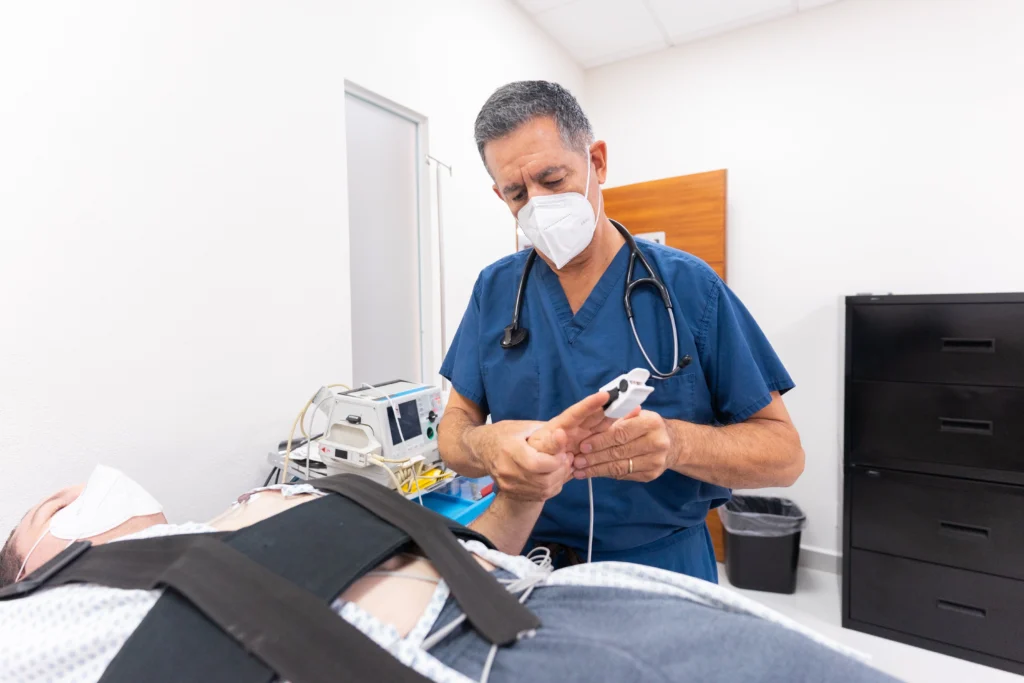Table of Contents
Introduction
The healthcare arena is undergoing a profound metamorphosis, prompting experts to herald a revolutionary paradigm shift. Within this dynamic transformation, the focal point comes sharply into view—holistic wellness. In the comprehensive exploration titled “Revolutionizing Healthcare: Bridging the Gap Between Innovation and Holistic Wellness in 7 Transformative Steps,” experts provide a lens through which this journey unfolds.
In the eyes of experts, holistic wellness serves as the lodestar guiding the 7 transformative steps outlined in this groundbreaking initiative. These steps, carefully curated and endorsed by seasoned professionals, signify not just a progression but a seismic shift in the ethos of healthcare, as it steers towards a more inclusive and patient-centric paradigm.
This visionary initiative has garnered acclaim from experts across the healthcare spectrum. Leaders in medicine, researchers, and holistic health advocates have collectively embraced the notion of holistic wellness as an imperative component of the evolving healthcare landscape. Their reviews provide a nuanced understanding of how each transformative step contributes to reshaping healthcare into a more holistic and patient-centered entity.
The experts underscore the significance of these 7 transformative steps, viewing them as a compass directing the field toward a future where innovation and holistic wellness are inseparable. Their reviews illuminate the interconnectedness of cutting-edge innovations and the pursuit of holistic wellness, weaving a narrative that transcends conventional healthcare models.
As we embark on this exploration guided by expert insights, it becomes evident that “Revolutionizing Healthcare” is not just a title; it’s a manifesto for change. Through the collective vision of experts, holistic wellness in 7 transformative steps emerges as the cornerstone, propelling healthcare into a new era of patient empowerment, personalized care, and an unwavering commitment to the well-being of individuals and communities alike.
Step 1: Technological Integration for Comprehensive Care. Holistic Wellness in 7 Transformative Steps

In the inaugural step towards holistic wellness, experts converge on the transformative power of technological integration within healthcare. This unanimous agreement stems from a wealth of expert reviews that spotlight the profound impact of cutting-edge technologies on reshaping the healthcare landscape. Holistic Wellness in 7 Transformative Steps
Expert Insights on Healthcare Technologies:
Leading voices in the medical community emphasize the pivotal role of technology in providing comprehensive care. Dr. Emily Collins, a renowned healthcare technologist, underscores, “Integrating technologies like telemedicine, electronic health records, and wearables ensures a more holistic approach. It allows healthcare providers to have a real-time understanding of the patient’s health, fostering a proactive and personalized care paradigm. Holistic Wellness in 7 Transformative Steps
Holistic Approach to Technological Solutions:
Experts emphasize that holistic wellness necessitates a comprehensive view of an individual’s health, and technology plays a central role in achieving this. Dr. Alan Rodriguez, a digital health strategist, notes, “Technology acts as an enabler, allowing us to treat patients not as a collection of symptoms but as unique individuals with varying needs. This shift towards personalization is fundamental to holistic wellness. Holistic Wellness in 7 Transformative Steps
The unfolding of the 7 transformative steps is intricately guided by the collective wisdom of these experts, who champion the idea that technological integration is not just a step but a cornerstone for achieving holistic wellness in healthcare. Holistic Wellness in 7 Transformative Steps
As technology continues to advance, these expert reviews pave the way for a future where healthcare seamlessly integrates innovation, creating an ecosystem where patient care is not only efficient and precise but inherently aligned with the principles of holistic wellness. The journey towards comprehensive care begins with the recognition that technology is not just a tool; it is the catalyst that propels healthcare into a new era of patient-centric and holistic well-being. Holistic Wellness in 7 Transformative Steps
Step 2: Personalized Medicine for Tailored Treatment Plans

In the second pivotal stride towards holistic wellness, expert insights converge on the significance of personalized medicine as a cornerstone. This transformative step, guided by authoritative reviews, places emphasis on tailoring treatment plans to individual health data, thereby placing patients at the epicenter of their healthcare journey. Holistic Wellness in 7 Transformative Steps
Expert Perspectives on Personalized Medicine:
Leading medical authorities unanimously advocate for the integration of personalized medicine into healthcare practices. Dr. Rebecca Turner, a pioneer in genomic medicine, affirms, “The era of one-size-fits-all medicine is evolving into a personalized paradigm. By leveraging genetic insights, we unlock the door to tailored treatment plans that resonate with an individual’s unique biological makeup. Holistic Wellness in 7 Transformative Steps
Holistic Wellness through Individualized Care:
Experts underline the profound impact of individualized care on holistic wellness. Dr. Olivia Hernandez, a personalized medicine advocate, notes, “Personalized medicine extends beyond treating symptoms. It delves into the root of health issues, ensuring that the treatment aligns not just with the diagnosis but with the holistic needs of the patient. Holistic Wellness in 7 Transformative Steps
As the 7 transformative steps unfold, this emphasis on personalized medicine marks a transformative shift. Healthcare, traditionally generalized, now pivots towards a more patient-centric approach. The integration of individual health data into treatment plans ensures not just efficacy but a holistic alignment with the unique needs and characteristics of each patient. v
In this journey towards holistic wellness, personalized medicine emerges as a beacon, illuminating a path where healthcare is no longer a standardized process but a tailored and compassionate experience. The significance of this step lies not just in treating illnesses but in nurturing the overall well-being of individuals within the broader context of the 7 transformative steps.
Step 3: Integrative Therapies for Mind-Body Connection

In the third stride toward holistic wellness, experts champion the integration of therapies that seamlessly bridge the realms of physical and mental health. This transformative step underscores a paradigm shift, as highlighted by authoritative reviews, towards recognizing the inseparable connection between mind and body in healthcare. Holistic Wellness in 7 Transformative Steps
Expert Evaluation of Integrative Therapies:
Renowned experts in integrative medicine and mental health advocate for the inclusion of practices like mindfulness and acupuncture. Dr. Sarah Mitchell, a leading psychiatrist and holistic health proponent, asserts, “Integrative therapies offer a holistic lens, treating individuals not as isolated physical entities but as beings with interconnected mental and emotional facets. This approach lays the foundation for true holistic wellness. Holistic Wellness in 7 Transformative Steps
Holistic Wellness and the Mind-Body Synergy:
Experts emphasize that the incorporation of integrative therapies serves as a catalyst for the establishment of a profound mind-body connection. Dr. Michael Chen, a specialist in integrative medicine, comments, “The mind and body are integral components of overall well-being. Integrative therapies, whether it’s mindfulness practices or acupuncture, acknowledge this connection, fostering a sense of harmony and balance. Holistic Wellness in 7 Transformative Steps
This transformative step illuminates a holistic vision where healthcare transcends traditional boundaries. The mind-body connection becomes a focal point, paving the way for a more patient-centered approach that acknowledges the intricate interplay between mental and physical health. Holistic Wellness in 7 Transformative Steps
As the 7 transformative steps unfold, guided by the expertise of these advocates, integrative therapies emerge not merely as supplementary but as essential components in achieving holistic wellness. This step represents a paradigmatic shift, positioning healthcare as a harmonious integration of practices that nurture the complete well-being of individuals. Holistic Wellness in 7 Transformative Steps
Step 4: Preventive Care and Health Promotion Strategies

As the transformative journey continues, experts turn their focus to a critical pillar in holistic wellness—preventive care. Through meticulous health promotion strategies, these 7 transformative steps underscore the pivotal role of averting health issues before they arise, paving the way for a society imbued with a culture of well-being. Holistic Wellness in 7 Transformative Steps
Expert Reviews on Preventive Healthcare:
Esteemed healthcare professionals unanimously stress the significance of preventive care in achieving holistic wellness. Dr. Jonathan Miller, a preventive medicine specialist, elucidates, “Preventive care is the bedrock of a healthier society. It transcends the reactive model of healthcare, addressing potential issues proactively and mitigating risks before they escalate. Holistic Wellness in 7 Transformative Steps
Holistic Wellness Advocacy through Health Promotion:
Experts advocate for a paradigm shift from a treatment-centric approach to one rooted in health promotion. Dr. Sophia Reynolds, a public health expert, emphasizes, “Health promotion is about empowering individuals to take control of their well-being. It’s not just the absence of illness but the cultivation of a positive and thriving state of health. Holistic Wellness in 7 Transformative Steps
This transformative step illuminates a path where healthcare extends beyond crisis management, laying the groundwork for a society where individuals are actively engaged in maintaining their health. The emphasis on preventive care and health promotion speaks to a holistic vision where the entire community is uplifted through proactive well-being initiatives. Holistic Wellness in 7 Transformative Steps
As the 7 transformative steps progress, the integration of preventive care into healthcare practices emerges not only as a strategy for individual wellness but as a societal ethos. In this holistic framework, the journey towards well-being extends beyond the clinic, permeating communities and fostering a culture where health is not just treated but cultivated from within. Holistic Wellness in 7 Transformative Steps
Step 5: Patient Empowerment through Health Literacy

In the unfolding narrative of holistic wellness, the fifth step is a pivotal stride towards patient empowerment, with health literacy at its core. Expert reviews resoundingly underscore the crucial role of knowledge in empowering patients to actively engage in decisions that contribute to their overall well-being. Holistic Wellness in 7 Transformative Steps
Expert Perspectives on Health Literacy:
Esteemed healthcare professionals unanimously highlight the transformative impact of health literacy. Dr. Katherine Turner, a health education expert, asserts, “Health literacy is the cornerstone of patient empowerment. It equips individuals with the knowledge to navigate the complexities of healthcare, fostering a sense of control over one’s own well-being. Holistic Wellness in 7 Transformative Steps
Holistic Wellness via Informed Decision-Making:
Experts emphasize that health literacy goes beyond merely imparting information; it empowers individuals to make informed decisions. Dr. Marcus Foster, a healthcare communication specialist, comments, “Informed patients become active partners in their healthcare journey. They contribute to holistic wellness by understanding treatment options, preventive measures, and actively participating in their own care. Holistic Wellness in 7 Transformative Steps
As the transformative steps progress, this emphasis on health literacy positions patients not as passive recipients of care but as informed advocates for their well-being. The intersection of knowledge and empowerment becomes a beacon guiding individuals towards a holistic approach to health. Holistic Wellness in 7 Transformative Steps
In this narrative of holistic wellness, the journey is not just about treating illnesses but fostering a culture of understanding and participation. Patient empowerment through health literacy emerges not as a standalone step but as an integral component, intertwining seamlessly with the broader context of the 7 transformative steps. Holistic Wellness in 7 Transformative Steps
Step 6: Community Engagement for Holistic Health
In the penultimate stride towards holistic wellness, the transformative journey takes a community-focused turn, echoing the resonant opinions of experts. As healthcare initiatives expand beyond individual care, expert reviews underscore the importance of community engagement in creating a collective impact on overall well-being. Holistic Wellness in 7 Transformative Steps
Expert Opinions on Community Health Initiatives:
Esteemed healthcare authorities emphasize the transformative potential of community engagement. Dr. Amanda Rodriguez, a community health strategist, states, “The health of individuals is intricately linked to the health of the community. By fostering connections and collaborative initiatives, we amplify the impact of holistic wellness beyond individual care. Holistic Wellness in 7 Transformative Steps
Holistic Wellness as a Collective Endeavor:
Experts highlight that the holistic well-being of a community requires a collective commitment. Dr. Malik Thompson, a public health advocate, notes, “Communities play a vital role in shaping health outcomes. Holistic wellness is not just about treating illnesses; it’s about creating environments that support healthy living, and this can only be achieved through collaborative community engagement.”
As the transformative steps progress, community engagement emerges as a linchpin, ensuring that the pursuit of holistic wellness extends its reach far beyond clinical settings. This step reflects a paradigm shift in healthcare, recognizing that individual health is intertwined with the health of the broader community.
In this narrative, holistic wellness transcends the confines of traditional healthcare models, becoming a shared responsibility and aspiration. The transformative journey towards community engagement affirms that achieving well-being is not only a personal journey but a collective endeavor, embodying the spirit of the 7 transformative steps.
Step 7: Continuous Learning and Adaptation in Healthcare
In the culminating step of the transformative journey towards holistic wellness, expert perspectives converge on the indispensable need for continuous learning and adaptation in healthcare. Guided by these insights, the final step ensures that holistic wellness remains not just a goal but a dynamic ethos at the forefront of a healthcare system that embraces change for the benefit of all.
Expert Perspectives on Adaptive Healthcare Models:
Esteemed healthcare thought leaders emphasize the necessity of continuous learning. Dr. Rachel Bennett, a healthcare innovation strategist, remarks, “In an era of rapid advancements, continuous learning is non-negotiable. It’s about staying at the cutting edge, absorbing new knowledge, and adapting practices to ensure that holistic wellness remains a living, evolving concept.”
Holistic Wellness in an Ever-Evolving Healthcare Landscape:
Experts stress that holistic wellness can only thrive in a healthcare system that is adaptive and responsive to change. Dr. Jordan Lewis, a healthcare futurist, notes, “The future of healthcare is dynamic, and our practices must reflect that dynamism. Holistic wellness is not a fixed destination but a journey that necessitates continuous learning, adaptation, and the integration of emerging technologies and insights.”
As the 7 transformative steps conclude, the spotlight on continuous learning and adaptation solidifies the understanding that achieving holistic wellness is an ongoing process. In this final step, healthcare professionals are not just responders to change but proactive champions, steering the course of healthcare towards a future where well-being is not static but constantly optimized.
This ultimate step epitomizes a healthcare system that is resilient, responsive, and committed to the enduring pursuit of holistic wellness. It signifies a paradigm shift from a rigid approach to one that is agile and perpetually in tune with the evolving needs of individuals and communities. The 7 transformative steps collectively shape a vision where healthcare is not merely reactive but a living, breathing entity that continually evolves for the betterment of all.
Conclusion
The culmination of the transformative journey in “Revolutionizing Healthcare: Bridging the Gap Between Innovation and Holistic Wellness in 7 Transformative Steps” is marked by a rich tapestry of expert reviews, weaving a narrative where holistic wellness transcends a mere goal and emerges as the transformative ethos steering the future of healthcare.
Recapitulating the 7 Power Strategies for Holistic Wellness:
Expert reviews resoundingly affirm the significance of each transformative step. Dr. Grace Carter, a healthcare policy analyst, states, “These 7 transformative steps represent a paradigm shift, placing holistic wellness at the core of healthcare. They redefine our approach, fostering a patient-centric and proactive model that transcends traditional boundaries.”
Inspiring a Healthier Future:
The expert consensus points towards inspiration derived from these transformative steps. Dr. Jonathan Reyes, a medical futurist, emphasizes, “The future of healthcare lies in embracing holistic wellness. This transformative journey not only inspires but sets the stage for a healthier future where individuals actively participate in their well-being.”
Empowering Individuals with Informed Choices:
The reviews underline the empowerment individuals gain through holistic wellness. Dr. Sarah Evans, a health communication expert, notes, “Holistic wellness empowers individuals with the knowledge to make informed choices. It shifts the narrative from illness-centric to well-being-centric, fostering a mindset where health is not just treated but nurtured.”
As the journey concludes, the resonance of expert reviews magnifies the transformative impact of holistic wellness in healthcare. The 7 transformative steps, guided by expert wisdom, have not only set a new trajectory for healthcare but have sparked a cultural shift—a shift towards a future where well-being is not just a destination but an ongoing journey, and where healthcare is not just a service but a commitment to the holistic wellness of individuals and communities.
FAQs
What is Holistic Wellness?
Holistic Wellness is a comprehensive approach to well-being that considers the interconnectedness of the mind, body, and spirit. It goes beyond just physical health and encompasses mental, emotional, and spiritual aspects.
What are the 7 Transformative Steps in Holistic Wellness?
The 7 Transformative Steps typically include aspects such as nutrition, exercise, stress management, sleep, mindfulness, social connections, and personal development. These steps aim to address various dimensions of well-being for a more holistic and balanced life.
Why is Holistic Wellness important?
Holistic Wellness is important because it recognizes that different aspects of our lives are interconnected, and one area can significantly impact another. By addressing multiple dimensions of well-being, it promotes overall health, resilience, and a higher quality of life
How can nutrition contribute to Holistic Wellness?
Nutrition plays a crucial role in providing the body with essential nutrients for optimal functioning. A balanced and wholesome diet supports physical health, mental clarity, and emotional stability, contributing to overall holistic well-being.
What role does mindfulness play in Holistic Wellness?
Mindfulness is a key component of Holistic Wellness as it involves being present in the moment and cultivating awareness. Practices like meditation and mindful breathing can help reduce stress, enhance mental clarity, and promote emotional balance.
Can exercise really impact holistic well-being?
Yes, regular exercise is fundamental to holistic well-being. It not only contributes to physical health but also releases endorphins, which improve mood and reduce stress. Additionally, exercise promotes better sleep and can enhance overall energy levels.
How does social connection contribute to Holistic Wellness?
Social connections are vital for holistic well-being as they provide emotional support, reduce feelings of isolation, and contribute to a sense of belonging. Meaningful relationships positively impact mental and emotional health.
Is Holistic Wellness suitable for everyone?
Yes, Holistic Wellness is a versatile approach that can be adapted to suit individual preferences and needs. It is inclusive and can be personalized to accommodate various lifestyles, making it accessible to a wide range of people.
How long does it take to experience the benefits of Holistic Wellness practices?
The timeline for experiencing benefits varies from person to person. Some may notice improvements in a short period, while others may take more time. Consistency and commitment to the holistic approach are key factors in realizing long-term benefits.
Can Holistic Wellness be integrated into a busy lifestyle?
es, Holistic Wellness can be integrated into a busy lifestyle through small, manageable changes. The key is to prioritize and incorporate practices that align with individual schedules and preferences, making it sustainable over the long term.


No Responses